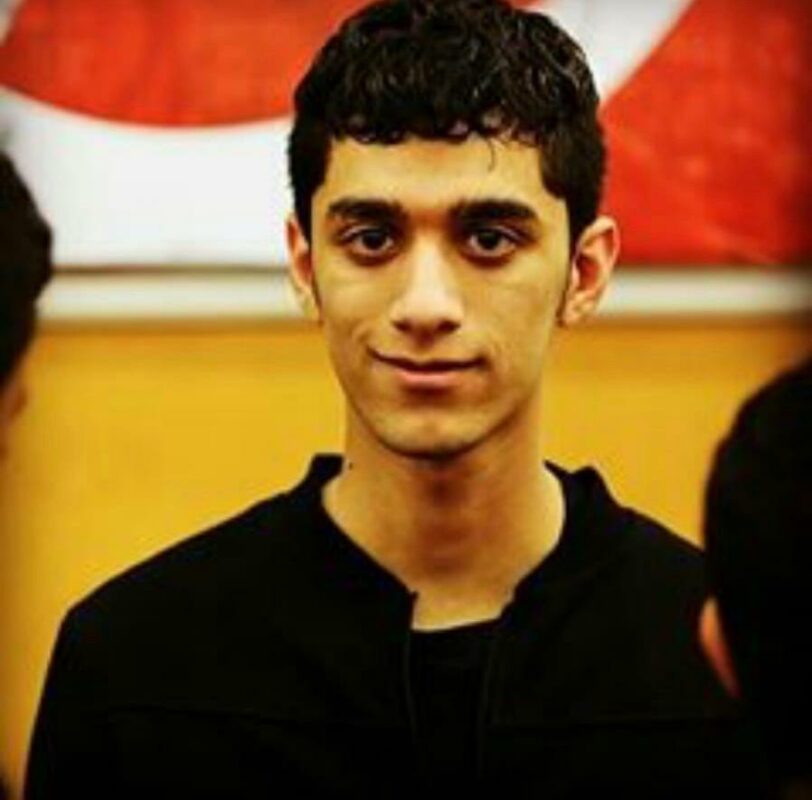Ali Naser Ahmed, the grandson of the spiritual leader of the Shia community in Bahrain, Sheikh Isa Qasim, was a 22-year-old Industrial Secondary School student when he was arrested without a warrant by Bahraini authorities during a raid on his home. Ali was tortured, forced to sign a confession to crimes he did not commit, and sentenced in a mass trial marred with fair trial violations. He is currently held in Building 16 of Dry Dock Detention Center.
On 16 January 2020, at 2:30 a.m., civilian officers, Commandos forces, and security officers, all masked and armed, stormed the house. They searched Ali’s room for 45 minutes, closing the door of the bedroom so that the family could not see what was happening. Outside, there were Nisan Patrols, Jeeps, civilian cars, and two small buses along with officers filling the neighborhood. When Ali and the officers emerged from the room, the officers were carrying Ali because he could not walk on his own, and they claimed he was sick. Ali called his family approximately an hour and a half after the arrest, telling them that he is at the investigation building. Following this call, he was forcibly disappeared for 26 days. The family submitted a complaint to the Ombudsman on 19 January regarding Ali’s mistreatment and disappearance, but the Ombudsman found no offense to be committed.
Ali was taken to the CID where he was interrogated and tortured. Ali was coerced into signing a statement confessing to charges brought against him, and eventually confessed to stop the torture. His statement was also taken by the public prosecutor in the investigation building, and no lawyer was present with him. After the interrogation, Ali was transferred to Dry Dock Detention Center. He was able to meet with his parents for the first time on 13 February 2020, and he looked visibly exhausted.
Ali was charged with: 1) Joining a group or organization for the purpose of disrupting the law or violating rights and freedoms; 2) Training on the use of weapons and explosives with the intention of committing a terrorist crime; 3) Providing or receiving support or funding for an association that practices terrorism. On 31 January 2021, Ali was sentenced to 15 years in prison in a mass trial which included 18 defendants, labeled the Soleimani Cell case. Ali was also denied access to an attorney during the trial and did not have adequate time and facilities to prepare the defense.
On 8 March, Ali was transferred to the Building 16 in the Dry Dock Detention Center, where he remains. The Dry Dock Detention Center has multiple confirmed cases of Coronavirus, and there have been reported cases in the same ward where Ali was held for a month, which places him at risk of contracting the virus.
Ali has been arrested several times since the beginning of the movement in Bahrain when he was very young. The first arrest was on 18 April 2013. Ali spent 105 days in Dry Dock Prison, and on 17 June 2014, he was sentenced to 3 years and 6 months for the charge of illegal gathering and assault. On 23 April 2015, Ali was taken to Salmaniya Hospital for treatment after he had fainted in Jau Mosque, and officers carried him out on a stretcher covered with his own blood. Someone informed the family that Ali was in a private guarded room in the hospital for treatment and that the cause of the injury and the effects of scabies were unknown. Ali was taken back to Jau Prison early even though he was still in need of treatment.
Ali was arrested for a second time at his grandfather Sheikh Isa Qasim’s house on 21 December 2016, during the violent dispersal of the peaceful assembly in Diraz. He was sentenced to one year in prison and released on a 200 Bahraini Dinar bail. Following the appeal, he was arrested once again to implement the verdict. He was arrested from his home for the third time to carry out the sentence.
The treatment Ali has suffered at the hands of Bahraini authorities, from his arrest to the torture and mistreatment he endured during detention, to being deprived of a fair trial, constitutes violations of international law, including the Convention Against Torture and the International Covenant on Civil and Political Rights, both of which were ratified by Bahrain. ADHRB calls upon the authorities to drop the preselected charges against Ali and to investigate claims of torture and inhumane treatment by CID officers in order to hold those officials accountable. Finally, ADHRB urges Bahraini authorities to hold a retrial for Ali that respects international standards of fair trial and his release, especially in light of the conditions of the Corona epidemic in prisons.





